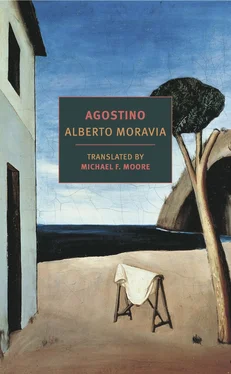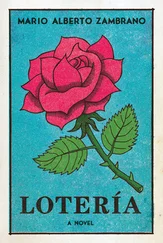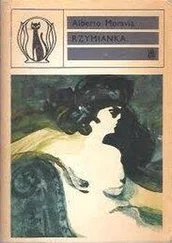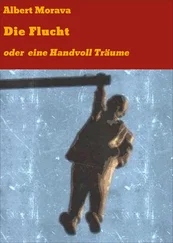“No,” Agostino said.
“And I say she would, immediately,” said Tortima. “She’d look me up and down, just to size me up, and then she’d say, ’Come on, Tortima, let’s have some fun.’”
All this horseplay made everyone laugh. At the sound of, “Come on, Tortima, let’s have some fun,” they all jumped into the stream, one after the other, diving in headfirst like the frogs who had been disturbed by their arrival a short while earlier.
The bank was surrounded by reeds so tall they could only see one stretch of the river. But from the middle of the current, they could see the whole stream which, with the imperceptible movement of its dark dense waters, flowed into the sea farther downstream, between the sandbanks. Upstream the river flowed between two rows of short fat silvery bushes that cast fluttering shadows over the reflecting water. In the distance a small iron bridge against a background of cane and poplar trees, dense and pressed tightly together, completed the landscape. A red house, half hidden between the trees, seemed to stand watch over the bridge.
For a moment Agostino felt happy as he swam while the cold powerful stream tugged at his legs, and he forgot every hurt and every wrong. The boys were swimming in all directions, their heads and arms breaking through the smooth green surface. Their voices echoed clearly in the still air. Through the glassy transparency of the water, their bodies looked like white offshoots of plants that, rising to the surface from the darkness below, moved whichever way the current took them. He swam up to Berto, who was nearby, and asked, “Are there a lot of fish in this river?”
Berto looked at him and said, “What are you doing here? Why don’t you keep Saro company?”
“I like swimming,” Agostino replied, feeling hurt, and turned and swam away.
But he wasn’t as strong and experienced as the others. Tiring quickly, he let the current carry him toward the mouth of the stream. Soon the boys with their shouting and splashing were far behind him. The canebrake thinned, and the water turned clearer and colorless, revealing the sandy bottom covered with wavy gray ripples. After passing a deeper pool, a kind of green eye in the diaphanous current, he placed his feet on the sand and, struggling against the force of the water, climbed out on the bank. The stream flowed into the sea, swirling and forming almost an upswell of water. Losing its compactness, the current fanned out, thinning, becoming little more than a liquid veil over the smooth sands. The sea flowed into the river in light foam-tipped ripples. Here and there pools forgotten by the current reflected the bright sky in the squishy untrodden sand. Completely naked, Agostino walked for a while on the soft gleaming sand, amusing himself by pressing his feet down hard and watching the water instantly rise up to flood his footprints. He was feeling a vague, desperate desire to cross the river and disappear down the shore, leaving behind the boys, Saro, his mother, and his whole former life. Who knows if by walking straight ahead, along the sea, on the soft white sand, he wouldn’t reach a land where none of these awful things existed. A land where he would be welcomed as his heart desired and be able to forget everything he had learned, and then relearn it without shame or offense, in the sweet and natural way that had to exist and of which he had a dark presentiment. He looked at the haze on the horizon enveloping the ends of the sea, the beach, and the woods, and he felt drawn to that immensity as if it were the only thing that could release him from his servitude. The shouts of the boys, heading across the beach toward the boat, awakened him from these sad imaginings. One boy was shaking Agostino’s clothes in the air. Berto shouted, “Pisa, we’re leaving.” He shook himself and, walking along the shore, reached the gang.
All the boys crowded together in the shallow water. Saro was busy warning them paternally that the boat was too small to hold everyone, but he was obviously joking. Like madmen, they threw themselves at the boat, shouting, twenty hands grabbing at the sides, and in the blink of an eye the boat was crammed with their gesticulating bodies. Some lay down on the floor. Others piled up in the stern near the tiller. Others took the bow, and yet others took the seats. Lastly some sat on the edges, letting their legs dangle in the water. The boat really was too small for so many people and the water came almost all the way up the sides.
“So everybody’s here,” said Saro, filled with good humor. Standing up, he unfurled the sail, and the boat glided out to sea. The boys saluted the departure with applause.
But Agostino didn’t share their good humor. He thought he spied an opportunity to clear his name and be exonerated from the slander weighing on him. He took advantage of a moment when the boys were arguing to approach Homs, who was alone, perched in the bow, looking in his blackness like a new style of figurehead. Squeezing his arm tightly he asked, “Listen here, what did you go around telling everyone about me?”
He had chosen the wrong moment, but it was the first opportunity Agostino had found to approach the black boy who, aware of Agostino’s hostility, had kept his distance the whole time they were on land. “I told the truth,” Homs said, without looking at him.
“What do you mean?”
The black boy uttered a sentence that frightened Agostino. “Don’t press me, I only told the truth, but if you keep pitting Saro against me, I’m going to go tell your mother everything. Watch out, Pisa.”
“What?” exclaimed Agostino, feeling the abyss opening beneath his feet. “What are you talking about? Are you crazy? I… I…” he stuttered, unable to put into words the lurid image that had suddenly materialized before him. But he didn’t have time to continue. The whole boat had erupted in laughter.
“Look at the two of them, one next to the other,” repeated Berto, laughing. “We should have a camera to take a picture of the two of them together, Homs and Pisa. Stay where you are, lovebirds.” His face burning with shame, Agostino turned and saw everybody laughing. Even Saro was snickering beneath his mustache, his eyes half closed behind the smoke from his cigar. Recoiling as if he had touched a reptile, Agostino broke away from the black boy, pulled his knees to his chest, and stared at the sea through eyes brimming with tears.
It was late and the sun had set, cloudy and red on the horizon above a violet sea riddled with sharp glassy lights. The boat was moving as best it could in the gusts that had suddenly risen, and all the boys on board made it tilt dangerously to one side. The bow was turned toward the open sea and seemed to be headed not for land but for the faint outlines of faraway islands that rose from the swollen sea, like mountains above a plateau. Holding between his legs the watermelon stolen by the boys, Saro split it with his sailor’s knife and cut it into thick slices that he distributed to the gang paternally. The boys passed them around and ate greedily, taking big bites, digging their teeth in or breaking off big chunks of the flesh with their fingers. Then, one after the other, the white-and-green rinds were tossed overboard into the sea. After the watermelon, out came the flask of wine, which Saro pulled solemnly from below deck. The flask made the rounds, and Agostino also had to take a swig. The wine was strong and warm and went right to his head. Once the empty flask had been stowed, Tortima started singing an obscene song, and everyone joined in on the refrain. Between the stanzas, the boys urged Agostino to sing along. Everyone could tell he was miserable, but no one spoke with him except to tease and make fun of him. Agostino’s sense of oppression and silent pain was made more bitter and unbearable by the fresh wind on the sea and the magnificent blazing of the sunset over the violet waters. He found it utterly unjust that on such a sea, beneath such a sky, a boat like theirs should be so full of spite, cruelty, and malicious corruption. A boat overflowing with boys acting like monkeys, gesticulating and obscene, helmed by the blissful and bloated Saro, created between the sea and sky a sad unbelievable vision. There were moments he hoped it would sink. He thought he would gladly die, so infected did he feel by their impurity and so ruined. Distant was the morning hour when he had first seen the red tarp on Vespucci beach; distant and belonging, it seemed, to an age gone by. Every time the boat climbed a big wave, the gang gave a shout that made him jump. Every time the black boy spoke to him with his repellent, deceitful, and servile deference, he retreated farther into the bow to avoid hearing him. The dark realization came to him that a difficult and miserable age had begun for him, and he couldn’t imagine when it would end. The boat drifted for a while in the sea, making it almost to the harbor and then turning back. As soon as they came ashore, Agostino raced away without saying goodbye to anyone. But then he slowed his step. Turning back, he could see in the distance, on the darkening beach, the boys helping Saro pull the boat onto dry land.
Читать дальше












